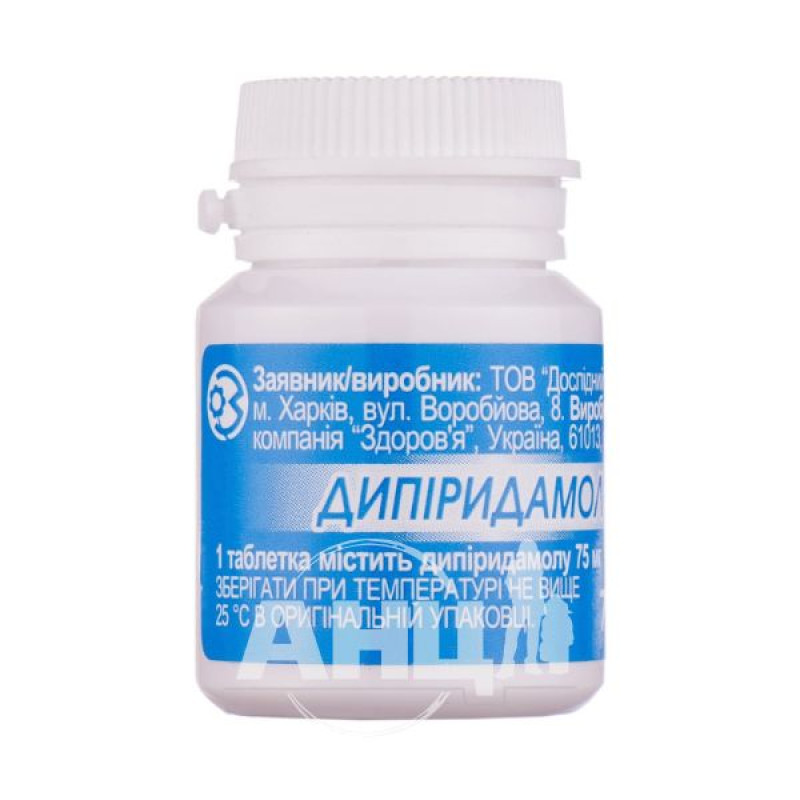Dipyridamole film-coated tablets 75 mg, can No. 40

Dipyridamole tablets are used for the following indications:
treatment and prevention of ischemic type cerebral circulation disorders; dyscirculatory encephalopathy; prevention of arterial and venous thrombosis, as well as their complications; prevention of thromboembolism after heart valve replacement surgery; prevention of placental insufficiency in complicated pregnancy; as part of complex therapy for any microcirculatory disorders.Composition
The active substance is dipyridamole (one tablet contains 75 mg of dipyridamole).
Excipients: lactose, monohydrate; potato starch; magnesium stearate; talc; gelatin; dry mixture "Opadry II white", which contains titanium dioxide (E 171), talc, polyethylene glycol, polyvinyl alcohol; dye: sunset yellow FCF (E 110) orange-yellow S.
Contraindication
hypersensitivity to the components of the drug; widespread stenosing atherosclerosis of the coronary arteries, acute myocardial infarction, decompensated heart failure, arterial hypotension (collapse), severe cardiac arrhythmias, unstable angina, subaortic stenosis, hemorrhagic diatheses, diseases with a tendency to bleeding (gastric and duodenal ulcer).Method of application
Adults and children over 12 years of age. Prescribe 75-225 mg (1-3 tablets of 75 mg) per day in several doses. In severe diseases, the daily dose can be increased to 600 mg.
The tablet should be taken on an empty stomach, not chewed or broken, and washed down with a liquid, for example, one glass of water. Treatment begins with minimal doses, which are gradually increased. The duration of treatment and dosage are determined by the doctor individually depending on the patient's condition, the course of the disease and tolerability. Dipyridamole can be used for long-term treatment.
Application features
Pregnant women
The use of the drug by pregnant women is possible only after the doctor carefully weighs the expected benefits and possible risks.
Children
The use of dipyridamole in children under 12 years of age is not recommended due to lack of sufficient clinical experience.
Drivers
Even when used properly, dipyridamole may indirectly impair the ability to drive or use machines, as reactions may be altered due to a decrease in blood pressure.
Overdose
Symptoms: feeling of warmth in the body, facial flushing, general weakness and dizziness, arterial hypotension, tachycardia, angina attacks.
Treatment: gastric lavage, induction of vomiting, use of sorbents.
The vasodilator effect of dipyridamole can be reversed by administering aminophylline (50-100 mg over one minute). If angina attacks occur, sublingual nitroglycerin is used.
Side effects
On the part of the cardiovascular system: headache and dizziness of vascular origin, arterial hypotension, feeling of heat and tachycardia, especially in people taking vasodilators, increased manifestations of ischemic heart disease, such as angina pectoris, arrhythmia, myocardial infarction, redness of the skin, accompanied by a feeling of heat.
Gastrointestinal: nausea, vomiting, diarrhea, dyspepsia.
Skin and subcutaneous tissue disorders: short-term skin rash, urticaria are possible.
On the part of the immune system: hypersensitivity reactions, including skin rashes, urticaria, severe bronchospasm and angioedema are possible.
From the blood and lymphatic system: very rarely, an increased tendency to bleed during or after surgical interventions was observed, in some cases, thrombocytopenia developed.
Musculoskeletal and connective tissue disorders: muscle pain.
On the part of the digestive system: dipyridamole was found in gallstones.
Storage conditions
Store in the original packaging at a temperature not exceeding 25 °C, out of the reach of children.
Shelf life - 3 years.
There are no reviews for this product.
There are no reviews for this product, be the first to leave your review.
No questions about this product, be the first and ask your question.
